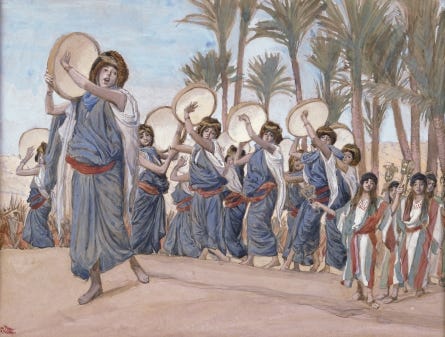It is Exodus 14:26. The Jews, who have endured hundreds of years of brutal Egyptian slavery, have a shot at freedom. God had just enacted the Ten Plagues, each afflicting a different aspect of Egyptian philosophy and society that enabled the slave system. The Jews, led by Moses and instructed by God, are on the run toward the desert. The Egyptians, even after the Tenth Plague (the death of the firstborn), are in pursuit on their chariots – the most advanced military transportation of the time.
If the Jews make it to the desert, they will be en route to becoming a free people in the Promised Land. If they are captured, they will be either enslaved or killed.
It is not looking good, as the chariots are right behind us. Then God tells Moses to “stretch out your hand over the sea.” Moses does so, and the sea parts. The Jews make it across, and the Egyptian chariots – in a great irony – get stuck in the mud. The charioteers are washed away. The Jews are safe, en route to Israel.
What do the Jews, having witnessed and benefited from this divine miracle, do? They could have had a strategic meeting, they could have had a prayer session, they could have done any number of things. After all, they had nowhere to go or nowhere to be (at least immediately).
Their choice – their very first action as a free people – is to “sing a song to God.” The melody is, of course, lost to history. But the lyrics, presumably written by Moses, are recorded in Exodus 15:1. They do what lyrics often do. As Leon Kass writes in his brilliant book, Founding God’s Nation: Reading Exodus, the lyrics at the song of the sea “both express and shape the Israelites’ feelings.” They exalt God, and then recount the specifics of how God guided them to freedom – manifesting another potential of song lyrics, which is implanting a feeling or an event in the memory to be recalled whenever the song is sung or heard.
But that’s not all. The song concludes with a purpose. The Jews sing of being “redeemed” in order to arrive at God’s “holy habitation” – the Land of Israel.
The early 20th century Florentine commentator Rabbi Umberto Cassuto noted something missing – and interesting – about the song. It does not mention Moses, which is especially instructive given the genre. Ancient victory songs normally focus on the victorious leader, but Moses does not refer to himself even once in the sequence.
(‘The Songs of Joy’, c. 1896-1902, by James Tissot, 1836-1902)
Fast forward to 2008. The University of Kentucky Professor Nathan DeWall was listening to a popular song by the band Weezer – “The Greatest Man Who Ever Lived.” Professor DeWall reflected, “Who would ever sing that aloud?”
The song inspired him to do a study – which he published as “Tuning in to Psychological Change: Linguistic Markers of Psychological Traits and Emotions Over Time in Popular US Song Lyrics” in 2011. He analyzed the lyrics of the top hits on Billboard since 1980 – and found that the use of “I” and “me” had skyrocketed, while those of “we” and “us” had remained stable.
This lyrical trend was far from that of Moses – whose great song in Exodus broke from custom and did not even mention himself. It spoke to what Professor Jean Twenge identified in the title of her 2010 book The Narcissism Epidemic.
Fast forward fifteen years, to 2023. The best-selling song of the year: “Flowers” by Miley Cyrus. It is a song about a break-up – a rich topic for lyrics that has inspired classics such as Neil Sedaka’s “Breaking Up is Hard to Do,” Frank Sinatra’s “Softly as I Leave You” and George Strait’s “Cowboy Rides Away.”
(Frank Sinatra, Studio Portrait, c.1957)
But “Flowers” is entirely different – and makes sense only in a popular music culture that welcomes the narcissistic phenomenon that Professor DeWall identified. Miley Cyrus says that she is better-off after the break-up because she discovered that she can “hold my own hand” and “buy myself flowers.”
We have come a long way since the Song of the Sea. But it need not stay that way.
Music is a source of individual enjoyment, group bonding (oxytocin – the “love hormone” – is released upon singing together) and a highly effective way to store everything from information to emotions. But that’s not all. It has profound strategic and moral implications, as Moses and the Jews demonstrated at the Song of the Sea. It both reflects and creates who we are, in large part by conditioning the imagination.
This insight, brought to us in Exodus at the Song of the Sea, is more real than ever. I am sure that most Americans (including this one) cannot name a poem or even a poet in my lifetime – as that art form has been taken over by lyrics, probably since the dawn of recorded music. These lyrics give us the choice that the Torah speaks of – more than ever.
The same person who yearns in accordance with “You Never Can Tell” – so magnificently done by Chuck Berry and then Emmylou Harris – will become fundamentally different if he is instead inspired by “Flowers.”
One who is pumped up by Gold City’s “God’s Building a Church” will gain a purposeful energy that he will be denied by Nirvana’s “Smells Like Teen Spirit.”
One who enjoys upbeat music will develop an entirely different view of respect and dignity by listening to “Never Too Much” by Luther Vandross rather than anything by Cardi B – whose lyrics cannot be cited in these respectable pages.
One who wants to love a place can start (and go a long way) with Frank Sinatra or Ella Fitzgerald singing “Moonlight in Vermont,” “Stars Fell on Alabama,” “Isle of Capri,” “Autumn in New York,” “Manhattan,” “Chicago” or “A Foggy Day (in London Town).”
One who wants to express or deepen a love should treat him/herself to Ella, Frank and Elvis singing “All the Things You Are,” “You Do Something to Me,” “The Wonder of You” or (best of all) “Nearness of You.”
As for me – I’m looking forward to April 10, as that is when Dwight Yoakam is playing the Beacon down the street from where we live. Erica and I are taking Aviva (who is nine) – as classic country is a magnificent American creation that is under-appreciated in New York City. I’m hoping that Dwight Yoakam plays his classic, “Try Not to Look So Pretty” – which is the one thing that Erica (despite my playing it for her) has not done exceptionally well.




Really got it right with the reference to chuck berry’s “ you never can tell”!